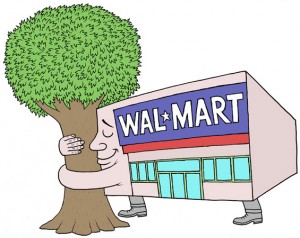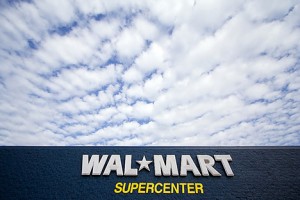
After a great deal of bad press, such as the 2005 film The High Cost of Low Prices, the retail giant Wal-Mart has been feeling the pressure to clean-up their tainted public image. While they still have a way to go, on October 14th, Wal-Mart announced significant sustainable agriculture goals that has caught the food industry’s attention.
One large -and important- goal is to require 100% certified sustainable palm oil for all Wal-Mart private label brands by 2015. In case you’re wondering what certified sustainable palm means, it denotes palm oil that has been certified by either the Roundtable on Sustainable Palm Oil (RSPO) or another independent certification scheme such as Rainforest Alliance’s that can guarantee that particular batches of palm oil have not been grown at the expense of natural forests.
Palm oil is one of the leading causes of tropical deforestation in countries like Indonesia, which is home to endangered species such as the Orang-utan and Sumatran Tiger, as well as over 700 distinct Indigenous communities.

Since our current reality situates Wal-Mart as nearly unavoidable for many consumers who rely on their low prices and convenience, having the colossal company on board with “sustainable” palm oil is a huge milestone for the responsible palm oil movement.
The commitment to responsible palm oil will also help the corporation meet another of its environmental goals: in February of this year, they announced a plan to cut greenhouse gas emissions from their supply chain by 20 million metric tons, the equivalent of taking 3.8 million cars off of the road for a year.
Indonesia is the world’s third largest emitter of greenhouse gases, mostly due to deforestation and burning of high-carbon value peat bogs as palm oil plantations expand into rainforest land, often illegally.

In fact, on October 14th, 2010, head of the land and forest fires department at Indonesia’s Environment Ministry, Purwasto Saroprayogi, postulated that illegal burning of Indonesia’s rainforests for palm oil expansion is creating the worst air pollution levels in neighboring Malaysia and Singapore since 2006.
Wal-mart’s recent committment on sourcing 100% certified sustainable palm in private label by 2015 marks a huge shift in market trends in the U.S. It’s ramping up the pressure on the United States’ largest palm oil importer and supplier, Cargill.
Cargill decision-makers are scrambling to figure out how to speed up the process of sourcing certified, segregated palm to their many U.S. customers including Wal-mart. Wal-mart sources their palm from Cargill and in the light of these increased demands from customers like Wal-mart and General Mills, Cargill is going to have to figure out how to meet customer demands or risk losing contracts.
This is also significant because it’s going to get RSPO certified palm oil on shelves in China and India, in Wal-mart stores. China and India, two countries responsible for creating the world’s highest demand for palm oil, are very important puzzle pieces in the push to create demand-side drivers for responsible palm.
Many are skeptical of Wal-Mart’s new environmentally-friendly undertaking, but if they can produce the results they promise, it will only be a matter of time before suppliers will have to meet their rather hefty demand for sustainable palm oil. That means you, Cargill.











